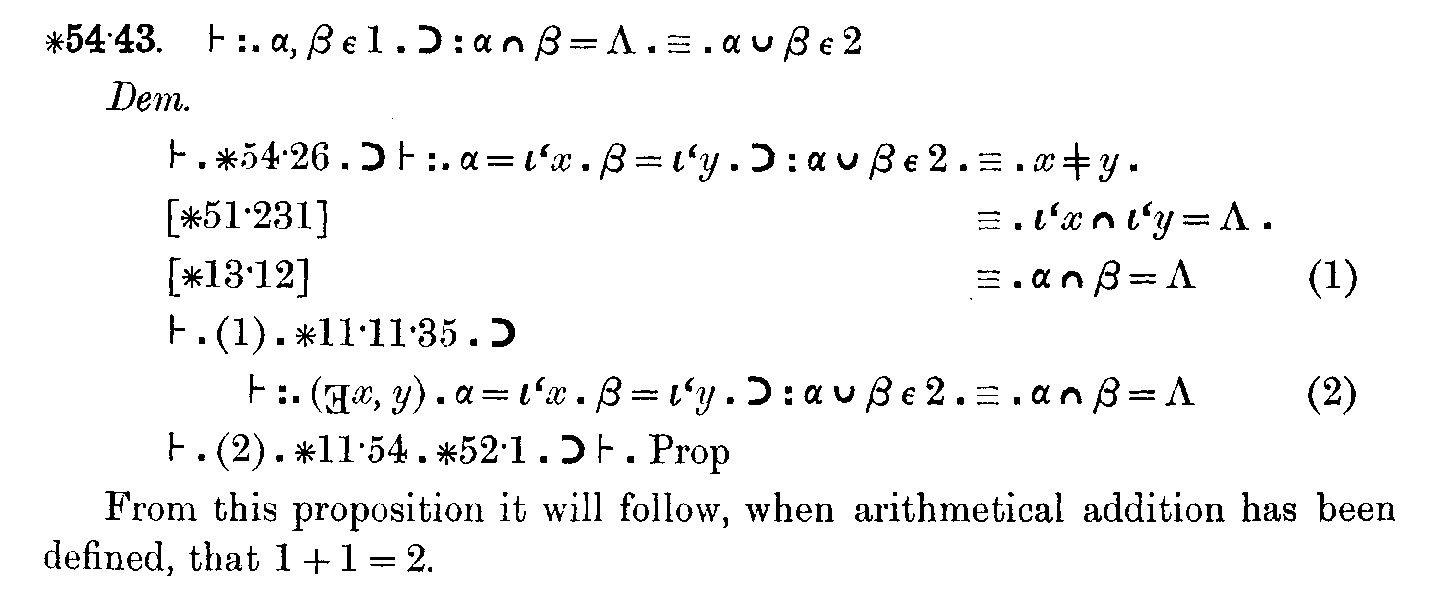Bertie - Lord Russell we should say!
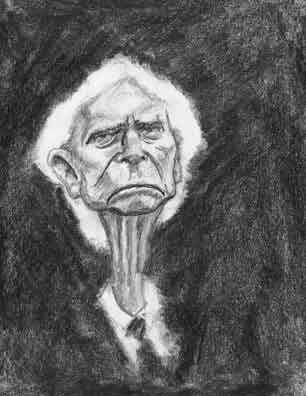
Bertrand Russell
Lord Russell, we should say.
Bertram Arthur William Russell was born May 18, 1872 to a family of - for the times - weirdos. His dad, John Russell, was an outspoken atheist who believed in free love and didn't get upset when his wife started fiddling around (John fiddled a bunch himself, too). Bertie's grandfather, also named John, was the 1st Earl Russell and was twice Prime Minister under Queen Victoria.
Bertie barely remembered his parents. His mother died in 1874 and his father in 1876. Despite his father's will stipulating that Bertie be raised in a house free of religion, his grandmother - quite the opposite of her son - raised Bertie as a devout Christian. She was, though, of liberal leanings, and as was commonplace at the time, accepted Darwinism as fully conistent with Christianity. Bertie, though, had a natural tendency to question everything, and by the time he entered college had abandoned religion of any kind as illogical and pooh-poohed it as a product of fear and ignorance.
Showing an early interest in numbers and geometry, Bertie entered Cambridge University which at the time housed some of the greatest mathematicians of the era. The young undergraduate's ability was noticed by Alfred North Whitehead, himself only 29 and a fellow at Trinity College. Alfred became Bertie's tutor and later collaborator.
After receiving his degree - although in name a BA, it was for all practical purposes a Ph. D - Bertie himself was elected a fellow of Trinity. Now with an income (the Russells, though of the aristocracy, were not that rich) he married an American Quaker girl, Alys Pearsall Smith. Sometimes pictured as a very conservative and traditional Quaker - her family used "thee" and "thou" in conversation - she was quite progressive in her outlook and once gave a talk to the girls at Bryn Mawr on the virtues of free love. That doesn't mean that she thought she and Bertie should practice what they preached, of course. But when she later found that Bertie did practice what they preached, they separated in 1911 and divorced ten years later. Bertie went on to marry three other times and had a number of girlfriends.
Frank, Bertie's older brother, became 2nd Earl Russell after their grandfather died and Frank himself died in 1931. So Bertie inherited the title and with it the right to be addressed as "Lord Russell". He was, however, an informal man and when the faculty of Harvard asked Alfred Whitehead, who was then teaching in the philosophy department, how they should address the new earl, Alfred replied, "Well, I always call him 'Bertie'". There was also the question of what name Bertie would pick - the titled name of a British nobleman need not be his actual given surname - Bertie horrified his fellow members of the House of Lords by saying he would choose the name "Lord Snooks". He was joking, of course.
In the 1940's Bertie was giving a series of lectures at the Barnes Foundation in Lower Merion, Pennsylvania. He was living in the small town of Malvern and commuting back and forth on the still extant Philadelphia Mainline train. Although his relationship with the foundation's founder, Albert C. Barnes, became rather strained, Bertie used the lectures as a basis for the book A History of Western Philosophy. The book became a bestseller, relieved Bertie's financial problems (at times he had to really scratch for cash), and in 1950, won him the Nobel Prize in Literature. By then Bertie was in his late 70's and kept going strong until he died at age 97, in 1970.
Sadly, in this brief essay, we will not be able to rehearse all of Bertie's many accomplishments. But we can go through a few of the most interesting ones at least.
Russell's Paradox and Bertie's Solution
In 1901 Bertie was writing one of his earliest books, The Principles of Mathematics. In the course of writing he found an inconsistency which threatened to derail the idea that mathematics could be derived from a set of simple axioms and the principles of logic. Bertie found the problem when he began to think about sets.
Anyone who has taken any math class has studied sets. Sets are simply collections of objects - rocks, gerbils, cats, philosophers. But once you have created sets, you can also collect the sets into sets. For instance, you can group cats by color: orange cats, grey cats, white cats, and black cats - put these sets together and you have a set of sets. So a set of sets is a quite an ordinary concept and has a crucial place in the development of mathematics.
Now a collection of objects is not the same as one of the objects. For instance, the set of individual fatuous philosophers is not itself an individual fatuous philosopher. A pride of lions is not a lion. A bevy of beautiful babes is not itself a beautiful babe (it's actually much better). So these sets obviously cannot contain themselves.
On the other hand, when you start grouping sets into sets - that is, the elements of a set are themselves sets - you have at least the possibility that the set can contain itself. It doesn't have to, but it can.
For instance, consider the set of all sets. It is a set obviously. But if it contains all sets, it also must contain itself. So at least conceptually we can say that you can divide all sets into two classes: those that do not contain themselves, and those that do.
Now let's collect all the sets that do not contain themselves into a set. Does it contain itself?
Well, if the set does contain itself, then by it's own definition, it cannot contain itself. On the other hand, if it does not contain itself, then by definition, it must contain itself. In other words, the set simultaneously does and does not contain itself.
This problem - published in 1903 - is known as Russell's paradox. It is very much like the brain teaser about the mailman. Let's say that the mailman is supposed to pick up and deliver the mail to everyone who does not pick up their own mail. Of course, he is not supposed to pick up the mail for everyone who does pick up their own mail.
So what is the mailman supposed to do about his own mail? If he picks his mail up, he isn't supposed to pick it up. But if he doesn't pick it up, he is supposed to pick it up.

Russell's Paradox
What does the mailman do?
Or consider the barber who is supposed to shave all men who do not shave themselves and does not shave the men who do shave themselves? Who shaves the barber?
Just how important are such antimonies as these puzzles are often called? Aren't they simply word games to play at a party when the hot tub is broken? Actually the paradoxes are more important than you might think and are crucial in determining if the rules of logic actually work or not, and what can and cannot be proven.
There is a theorem that if a logical or mathematical system permits a paradox, then anything can be proven to be true. So if it is both true and false that a set contains itself, then you can prove white is black, black is white, and green in blue. In fact, if you allow the famous "liar's paradox" - which comes from a strict interpretation of the Bible - you can start out with "God created man in his own image" and end up with God is a penguin.
Bertie's namesake paradox caused him a lot of worry. Finally he came up with a solution which at least solved his immediate problem. However it did not stop people from coming up with new - and some still unresolved - paradoxes.
Bertie decided that before you make a set, you must first define the elements of the set completely. So even if you want to make a set of sets, you must specify what the interior sets are. But then you must specify what the interior sets contain. They too may contain sets. Eventually you will continue on down until you reach the sets that are composed of elements that are not sets. This lowest level of sets are sets that are made up only of individuals - dogs, cats, rocks, teacups, philosophers and the like. Obviously these sets - Type I sets, Bertie called them - by definition do not contain anything that is a set and so cannot contain themselves. So for these sets, there is no Russell's paradox.
Now you can collect the first type of set into new sets. That's where we get sets like the cats grouped by color. So this Type II set contains sets, but only sets that are made up of individuals. But a Type II set itself is a set of sets, not a set of individuals. Therefore it cannot contain itself either! Again, no paradox.
In general what Bertie found was that the elements of one set must contain elements of the next lower type. That means a properly constructed set cannot contain itself. So Russell's paradox can never arise.
Bertie himself wasn't quite satisfied with the rather ad-hoc nature of what became known as Russell's Theory of Types, and a lot of other people weren't either. So mathematicians kept working on ways to develop axioms into a rigorous set theory that would eliminate the paradoxes but still keep everything everyone wanted to prove. The most successful set systems are the Zermelo-Franklin set theory and Von Neumann-Bernays-Godel theory, and both have axioms where a set cannot contain itself. But why the theory of types is ad-hoc and yet slapping an axiom like ∀S, S∉S in the theory is OK is kind of hard for many non-mathematicians to grasp. On the other hand, excluding a set from being a member of itself is a precise way of expressing the concept that a set is distinct from it's members even if such a distinction seems a bit arbitrary.
So if you're worrying about the mailman, don't. You can point out that what we have here is simply philosophical gimcrackery, and such a mailman cannot exist. If you use ordinary language correctly, you say, you'll realize the mailman's real job is simply to make sure the mail ends up in the hands of the person on the address. Expressed that way, there is no paradox.
And the barber? The one who shaves all the men in town who don't shave themselves and doesn't shave all the men who do. Is the barber a self-shaver?
Well, she could be.
On Denoting
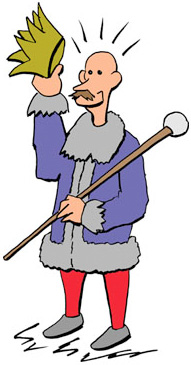
The current King of France
About the time Bertie was trying to resolve his paradox, he was also writing one of his most famous philosophical papers. This was "On Denoting" which appeared in Mind in 1905. In the paper, Bertie discussed ways to represent ordinary language by symbolic logic. As an analytic philosopher he was trying to show was that if you can transform ordinary language into a formal representation, then you have gone a long way in finding definite answers to what are apparently ambiguous questions.
One use of ordinary language which obscures meaning is when people talk about hypothetical or imaginary concepts. For instance, what is the answer to "How many horns does a unicorn have?" or "Is the present King of France bald?" Both are quite ordinary questions, and most people instinctively answer "One" to the first question and "No" to the second. But if there are no unicorns, how can they have any horns at all? If there is no king of France, how can you tell if he is bald or not? Can you even answer the questions? If so, what is the correct answer?
(Of course, you can also ask is there any point in answering the question or not. We won't get into that.)
The question about the King of France is the most problematic, and Bertie gave it a lot of thought. He finally decided that what the sentence really means is:
∃x[(Kx & ∀y(Ky→y=x) & Bx]
This sentence is literally stated as "For some x (∃x), x is the King of France (Kx), and for every y (∀y), if y is the King of France then y is the same as x (Ky→y=x), and x is bald (Bx)". The "if-then" statement is supposed to specify that there is at least one king of France among all other people.
To answer the question, though, we need to review a fundamental property of conjunctions, that is, sentences connected by "and" (&). A conjunction of two sentences is only true if both parts are true. Multiple conjunctions are also true only if all parts are true. So since Kx is false - that is, there is no king of France at present - then the entire conjunction with Kx is false as well.
So if you represent the sentence more simply as
A & B & C
since A = Kx and there is no x where Kx is true, then A is false. Then it doesn't matter if the B and C parts are true or not. The whole sentence is false.
A & B & C = False & ? & ? = False
Well, the problem is solved, right?
Weeeeeeelllllll, not quite. There is the possibility that the present king of France has a fine head of hair. So since we just showed that "The present king of France is bald" is false, can we then say that "The present king of France is not bald" is true?
Actually if you go through the same exercise we just did, you will find out if you substitute ¬Bx ("x is not bald") for Bx ("x is bald") nothing changes. That's because Kx is still false and negates the entire sentence. So the sentence "The present king of France is not bald" is also false!
For Bertie, this settled the question. He said no one should be upset because both sentences are false. It is simply that one sentence is not the negation of the other. They are both false since there is no present king of France.
(As an aside, the analysis is a bit more complex than outlined here as Bertie said the entire negation of "The present King of France is bald" is actually true. That's because the negation of a sentence of conjunctions produces disjunctions ("or") which all must be false for the whole disjunction to be false.)
Well, the problem is solved now, right?
But first we'll anticipate an objection.
Before we proceed, then, we need to step back and analyze the problem using set theory. When we're done, we will see that although at first glance everything may seem to agree with the above conclusion - and the present King of France is bald is true - we have to say not everyone agrees with Bertie's analysis. And then we'll see that, when you get down to it, it all doesn't matter anyway.
First we collect all things in the world into a set of bald things and a set of not-bald things. Any element, x, must be a set of one or the other.
For all x
x ∈ B
or
x ∉ B
But if x doesn't exist, then it can't be in a set of objects. So if x = "the present king of France" then both statements are false. So this set theoretical analysis does indeed agree with Bertie's conclusion that "The present king of France is bald" and "The present king of France is not bald" are both false. So we arrived at the same answer as Bertie.
But hold on there, Pilgrim, you say. Let's try another line of thinking. Specifically think about what we learned in school about the empty set, usually represented as φ.
The empty set is a set that contains nothing. That's a general way of putting it, but if you want to precisely and mathematically define the empty set, then you can simply define a set of something which is impossible. For instance, the set of all numbers, x, which are not equal to themselves is the empty set.
φ={x: x ≠ x}
This is verbalized as "Phi, the empty set, is equal to the set of all x such that x is not equal to x".
Of course, you can define the empty set in more mundane ways, like the set of all kings which are eighty feet tall, the set of all blue objects that are really green. And - yes - the set containing the current king of France - all are the empty set.
Now mathematicians tell us that you can create subsets from a set - that is smaller sets composed of elements from a larger set. An important property of a subset is than any element in the subset is also an element in the original set.
if x∈A and A⊂C, then x∈C
Finally, you learn - and this is in every book which talks about sets - that one subset that is contained in every set is the empty set. So the set of all bald things contains the empty set and the set of all non-bald things also contains the empty set.
So if k is the actual current king of France (who does not exist), then why can't write the following?
k∈φ
Then we plug k and φ - the empty set - into the penultimate equation and we get:
If k∈φ and φ⊂B then k∈B
So if the present (and non-existent) king of France is an element of the empty set, it must also be an element of all other sets. So the king is an element of the set of all bald things - and an element of the set of all non-bald things as well! So the sentence "The present king of France is bald" is actually true, and "The present king of France is not bald" is also true!
So what's wrong with that reasoning?
Sad to say the empty set has no elements. So nothing can be an element of the empty set - not even the empty set! In other words, the empty set contains the empty set; that is, the empty set is a subset of itself (as are all sets). When we say that a set contains a subset, then we mean we can select certain elements and make a new set. But the subset is not an element of the original set. A set contains itself but the set is not an element of itself. A set contains the empty set, but it is not an element of the set.
Perhaps the best way to illustrate the subtle difference between something being contained in a set and an element of the set is to show the following sets.
{ 1, 2, 3}
is a set whose elements are 1, 2, and 3. But the sets
{ 1 }, { 2 }, { 3 }
are contained in but not elements of the set { 1, 2, 3}. A set, even with only one elements, is not the same as the element. The empty set always contains no elements, and so the statement
k∈φ and φ⊂B
is always false. So our original conclusion that "The current king of France is bald" is indeed false.
But what messes up the conclusions is the requirement of "classical" formal logic that allows weird conclusions is that statements must be either true or false (hence, classical logic is called a "two valued" logic). They cannot be meaningless or nonsensical. Therefore you end up with are called vacuous truths. Vacuous truths are quite strange when stated in ordinary language but crop up everywhere in logic.
Specifically vacuous truths arise from "if-then" statements used for deduction. But - again we must emphasize that in classical logic - "if-then" statements are always true as long as the "if" part (the antecedent) is false regardless of whether the "then" part (the conclusion) is true or false (see the footnote below for why this is true). So if the "if" presumes something exists, but it doesn't, then the whole "if-then" statement is always true. The plus side is that this rule gives philosophers maximum flexibility for deducing proper conclusions. But as we said it also produces some sentences which, although they aren't really wrong, are definitely strange to everyday notions.
For instance when I say that "If Joe Blow is the king of France, then Joe Blow is bald", I always speak the truth! Even if Joe Blow is real and has a fine head of hair. If there is no king of France, then anybody we say is the king of France also makes the sentence true!
At this point you may say want to say, "And from this Bertie made a living?" Is all this high falootin' spouting just fatuous philosophical posings and misuse of language? Heck, does philosophy even mean anything?
These are quite legitimate questions. After all, if you ask how many horns a unicorn has, aren't we really just asking how many horns are represented in the descriptions or depictions of the mythical animal we call the unicorn? Put in real language - not the mishmash philosophers dream up - the answer is clear. The mythical unicorn by definition is always depicted with one horn. And we don't have to worry about whether a unicorn really exists or not because that's not part of the question. So to your Joe or Josephine Blow on the street, it certainly looks like the study of philosophy, rather than making questions clearer, is completely obscuring what we are really asking in the first place.
But yes. From this Bertie did make a living.
Enter Ludwig
It isn't just your Joe or Josephine Blow on the street who would say all this philosophical hogwash is, well, philosophical hogwash. Even some philosophers began wondering if it was worth our time arguing about topics like whether a non-existent king is bald when we have real things to worry about - things like world hunger, poverty, war, disease, and what's going to be on the telly tonight? It wasn't long before the Bertie himself was soon forced to face the question.
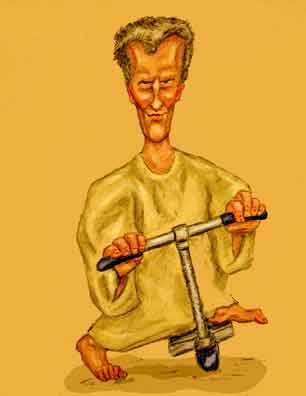
Ludwig Wittgenstein
He thought it was hogwash.
In 1911, a former aeronautical engineering student named Ludwig Wittgenstein stopped by Bertie's rooms in Cambridge. Originally from Austria, he had been studying at the University of Manchester but had gotten interested in pure mathematics and philosophy. Ludwig had contacted Gottlob Frege - one of the pioneers in mathematical philosophy - and Gottlob said the best place to study was at Cambridge with Bertie. Bertie accepted Ludwig as a student and although he had doubts about this excitable and tortured young continental, he later decided Ludwig was a genius who had a lot to teach his teachers.
After many years of study in places as varied as Cambridge and an Italian WWI POW camp, Ludwig decided that philosophers were in fact screwing everything up - an odd thing for a man to say who later became Professor of Philosophy at Cambridge. The meaning of a word or phrase, Ludwig decided, was determined by the manner in the way they were used. Therefore it's ridiculous to try to define something in an abstract sense. After all, as long as people use the word in the same way, then, they are agreeing on the meaning. So what if you see a color as red and someone else sees it a blue? You are talking about the same thing if what you say makes sense.
So when you tell someone that you had a good time at the party or if you thought the ridiculously expensive paté de fois gras wasn't good at all ("Huh! It tasted like ground up goose liver") or you think that the Queen of England certainly does a lot of good for her country, it's the context that dictates what the word means. So you can have a meaningful and unambiguous conversation.
Then say such things to a philosopher, and he will sit back, gaze abstractly at the ceiling, and ask "But just what does 'good' mean?" "How do we know if anything is truly 'good'?" "What makes 'good' men turn to evil?"
But look what he's done! The son-of-a-gun has taken the word out of context and so stripped it of any meaning. And then he asks what the friggin' word means! And of course there is not - and cannot be - any real answer to his - or any other deep philosophical questions.
For some, Ludwig's conclusions put an end to philosophy as it had been practiced for three thousand years. His conclusions suddenly made so much sense - even to philosophers - that he is now ranked as one of the most important philosophers of the twentieth century - or in history.
But we're talking about Bertie, here. Not Ludwig.
The Principia Mathematica
In 1910, Bertie and his old teacher, Alfred North Whitehead published the Principia Mathematica which eventually reached three volumes and is probably one of the most famous of books of earth shattering importance that no one reads. The Principia (not to be confused with Isaac Newton's work of similar name) was a derivation of mathematics from logic. Among the most fantastic, amazing, and important proofs was that 1 + 1 = 2.
It is still debated whether math really is a derivation of logic or not or whether it's just better to consider a number as a primitive concept not requiring a definition. Obviously we won't solve that problem here but a personal CooperToons opinion is it doesn't matter.
But the most important outcome of the Principia was not what Bertie or Alfred proved. It was what the mathematician and logician, Kurt Godel proved you could not prove. In 1931, Kurt used the Principia as the foundation of his famous theorem on undecidability. Kurt discovered that in Bertie and Alfred's system of numbers there are legitimate mathematical expressions which are true, but nevertheless cannot be proven within the system. To repeat - they cannot be proven within the system - an important point to emphasize.
In recent years, there has been a tendency (at least in some circles) to oversimplify Kurt's conclusions. It is very easy to take Godel's theorem and say he proved there are Great Truths of Life that cannot be proven, and so we should unquestionably accept the writings of the Bible, the Koran, the Torah, or the US Constitution (as good as the Bible to many) as true, beyond dispute, and dammit!, just shut up and believe them!
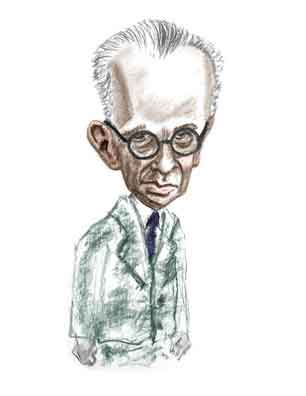
Kurt Gödel
He took Bertie's work further.
Of course, Kurt proved nothing of the sort. What he showed was that if you define the concept "number" in certain ways - that is, by a system as "rich" as Bertie's and Alfred's and if there are no contradictions in the system, then there are formulas that can be properly constructed that are true and to prove them true you must resort to proofs outside of the system itself (called meta-proofs). This is not the same thing as saying there are truths that can't be proven.
Conversely there has been also some who pooh-pooh Kurt's theorem saying it's obvious. After all there are uncountably infinite numbers each of have at least some truth associated with it. But on the other hand, there are only countably infinite symbols to prove theorems and theorems must be finite in length. So there are not enough theorems to prove all the truths. This is a simple (but informal) proof of Kurt's theorem. But as far as it being obvious, Georg Cantor had worked out the concept of countable and uncountable numbers back in the 1870's, but Kurt's theorem certainly wasn't proven until 1931 when Kurt published his paper.
Only then was it obvious.
Pacifism and War á la Russell
Bertie is often thought of as a pacifist. However, he was not a pacifist in the strictest sense of the word - that is someone who opposes all war. He just thought that in many cases a war was not worth fighting even if it meant surrender. He was opposed to World War I because he didn't think that giving into the Kaisar's demands was bad enough to warrant the millions of deaths that resulted. In many ways his views are not that different than those of the World War II cartoonist Bill Mauldin who said pacifists were right 90 % of the time, but there was always that 10 %. For Bertie, though, it was more like pacifists were right 99 % of the time.
Bertie took up the opposition to the war and wrote anti-war articles. This ultimately resulted in his arrest, and he was sentenced to either a £600 fine or a 180 day jail sentence. He refused to pay the fine or let anyone pay it for him and so spent much of 1918 in jail. Then when he was released, he had found he had lost his fellowship at Cambridge.
So began Bertie's life as a free lance lecturer, educator, and writer, a life that at times was rather impecunious, particularly for a man spouting heretical and controversial views that all "good" people (whatever that means) wanted to suppress. On the other hand, along came the 1930's and Bertie considered the Nazi regime well worth fighting against and supported World War II all the way.
Politics and Education
Politically, Bertie was a socialist but he believed in democracy - he did not see the two concepts as exclusive - and completely opposed any totalitarian regime. He was by no means a follower - or even an admirer of Karl Marx and went on record criticizing Marx as early as 1896. His main objection to Karl's philosophy was 1) he thought Karl was muddle headed, and 2) he saw Karl was advocating a dictatorship that was as bad as what he wanted to replace.
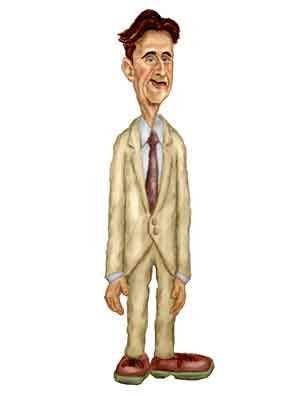
George Orwell
He and Bertie weren't fooled.
In 1921 Bertie actually visited the Soviet Union, just as it was emerging from the Russian Civil War following the Bolshevik Revolution. He did not like what he saw. Far from being a socialist state run by the proletariat, Russia had become a dictatorship run by a small committee, and when Stalin got in power, it was was nothing but a vast slave labor camp run by one maniac. Even with the (somewhat) thawing of tensions in the late 1950's and 1960's, Bertie remained opposed to Soviet Communism, as was fellow socialist George Orwell. The two men, in fact, were among the few socialists - and indeed any left-leaning politicians of the early twentieth century - that were not duped by the Russian revolutionaries' rhetoric.
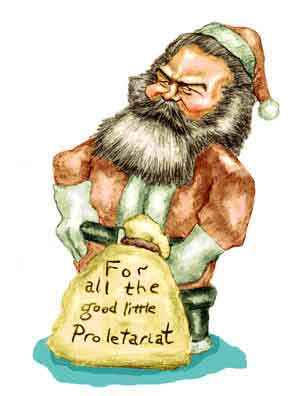
Karl Marx
Bertie was not impressed.
After World War II was over, Bertie entered into the debate on communism and the nuclear arms race. He continued to be extremely anti-Soviet and for a short time even seemed to advocate a pre-emptive nuclear strike against the Russians. Later he said he never made the claim, and when his own words were shown in evidence, he did some quick back peddling. In an essay published in 1956, Bertie said the way to fight communism was not through war, but through eradicating what made people turn to communism - poverty and hunger. The key to success was to show the world that democracy could achieve what communism could not.
On the other hand. Bertie's position - and opposition - to the war in Vietnam was unambiguous. He was an active demonstrator against the war and as a nonagenarian even participated in sit-ins with people 20 % his age. In one demonstration, he was arrested and sentenced to jail. But given his years - and fame - he was held in the prison hospital and released after a week.
Bertie was not a particularly successful politician in the conventional sense. He did run for parliament - in 1907, 1922, and lastly in 1923 - and lost each time with a resounding splat. Ironically, it was only after he - a staunch socialist - inherited his hereditary title as the 3rd Earl Russell - that he officially became a member of Parliament - in the House of Lords.
One area where Bertie backed a winning cause was in women's rights. He thought women should have the vote - a right that was surprisingly late arriving in either Britain or the United States - and they should have full equality with men. His views on sexual freedom were way ahead of his time and even now not really mainstream. All of his marriages (with the possible exception of the one with Alys) were - at least in principle - open. But Bertie found that there were practical problems with such arrangements despite the high idealism involved.
When Bertie lost his fellowship due to his WWI pacifism, he found freelance lecturing and writing was not that lucrative. So in the late 1920's, he and his second wife, Dora Black Russell, opened the Beacon Hill School, an experiment in progressive education. It was possible that this was the school that C. S. "Jack" Lewis was parodying in "The Voyage of the Dawn Treader" when introducing the character of Eustace Scrubb, a complete ass (the word used by Jack) who went to a "progressive" school where the most ill-behaved and disrespectful students were "interesting cases" to the headmaster.
The story is Bertie let the kids run around naked, and there is a photograph of one of the children taking a running leap toward the surf totally sans vêtements. And of course there is the famous (and apocryphal) story where the local vicar came calling. He knocked on the door to have it opened by a young girl entirely in the buff. "Good God!" the vicar exclaimed, upon which the girl said, "There is no God" and shut the door.
All in all, though, we have to say Bertie was a better logician, philosopher, and writer than he was a headmaster.
Bertie's Legacy
Next time you're out on the street - even in England - stop someone and ask if they know who Bertrand Russell was. If you happen to buttonhole a mathematician or logician, you'll probably get an affirmative reply - and a bit of a lecture. If it's someone interested in philosophy, very likely (at least if they are interested in real philosophy). But all in all, mention Bertie, and you'll get a blank look.
In the end, Bertie's most permanent legacy is indeed as a mathematical logician where his Principia formed the most complete derivation of number theory and led to the concept of undecidability. As a writer, his works naturally will end up a bit out of date - although the message of his writings - in one more humble CooperToons opinion - is as valid today as ever before. His History of Western Philosophy is still very good reading and a good introduction to the field.
Finally and as an aside, identifying Bertie's proof of 1 + 1 = 2 was one of the questions posed by Britain's intellectual comedian, Stephen Fry, on his celebrity panel show, Qi. Stephen mentioned that Bertie had particularly bad breath (Bertie smoked a pipe all the time) and then recounted Bertie's many achievements from developing the fundamentals of mathematics to campaigning for nuclear disarmament. At that point Ronni Ancona said, "What an extraordinary achievement, and you just have to bring up his halitosis." Then David Mitchell added "Imagine meeting him at a party. 'I met this bloke at a party, he stank, and when I asked him what he did, he said he proved that 1 + 1 = 2".
Stephen concluded by saying, "It's a very important principle to understand that you can be gossipy about someone's private hygiene and think they are one of the most towering and intellectual heroes that you could ever worship. The two don't rule each other out. But Bertie was a great man and we should be proud of him."
References
The Life of Bertrand Russell, Ronald Clark, Knopf (1976). Today this remains the definitive life about Bertie. However, when covering such a long time span - Bertie lived 98 years - certain episodes are compressed more than you'd like. You'd like more about Bertie's early life and years at Cambridge and his time after leaving Cambridge after World War I comes off like a whirlwind "Visit China, Europe, and America on $5 a Day For 20 Years". That's not too far off - Bertie was often strapped for cash, bordering on poverty, and only became truly solvent in his late seventies with the publication of A History of Western Philosophy.
"Does Gödel Matter? The romantic's favorite mathematician didn't prove what you think he did." Jordan Ellenberg, Slate. Professor Ellenberg points out that Godel's theorem is incorrectly generalized by many of the romantically inclined and goes so far to say that given it's huge theoretical importance in the field of mathematics, it's practical effect has been much less than we are led to believe. In fact, most mathematicians go through their entire careers with scarce a glance at what Kurt did, thank you.
An Addendum on Vacuous Proofs
The proof of a vacuous conclusion from a false antecedent comes from the idea that an "if-then" statement is equivalent to a "not-or" statement. In fact, sometimes (like in Bertie's Principia), the "not-or" statement is a primitive function and the "if-then" is defined to be equivalent.
A→B ≡ ¬ A V B
A little thought will show you that the two do serve the same purpose. When you say "If I go to the store, I will pick up a bag of chips", it is the same as "I will not go to the store or I will pick up a bag of chips." Since an "or" statement (called a disjunction) is true if either part of the individual sentences is true, then if the first sentence (A) is false, the negation makes the first half of the disjunction true. And so the whole sentence is true.
Or in terms of a proof:
If A is false then
¬A is true
and therefore
¬A V B is also true
regardless of the truth value of B.
Therefore by definition
A→B is true if A is false.
Such true statements are then said to be vacuously true.
All submarines three miles long are pink.
All submarines three miles long are chartreuse.
If 3 > 5, then 3 ≠ 3
If 3 > 5, then 3 = 3
All US presidents born in Moose Jaw, Saskatchewan, have eradicated poverty, hunger, and war for all time.
The thing to remember is that vacuously true statements do not prove the conclusion. A proof requires that if the premise (that is, the antecedent) is true, then the conclusion is also true.
Prisoner's Dilemma, William Poundstone, Doubleday (1992). A general introduction to the pros and cons and history of game theory, this book discusses Bertie's controversial statements that people took for advocating preemptive nuclear war.
Titus 1:12, "A certain one of them, a prophet of their own, said, 'Cretans! always liars, evil beasts, lazy bellies!'" (Young's Literal Translation). An early reference to the Liar's paradox. If a Cretan says "All Cretan's are liars.", is he telling the truth? Actually proper logic answers the question when you realize that the negation of "All Cretans are liars" is not "All Cretans tell the truth" but "At least one Cretan tells the truth at least once.
The Case of the Philosophers' Ring, Randall Collins (writing as Dr. John H. Watson, M. D.), Crown (1978). The Sherlock Holmes fans' introduction to Bertrand Russell. A footnote mentions Russell's paradox which might pique the reader's interest to delve into formal logic more thoroughly.
The story, by the way, is that Sherlock Holmes - and this is no joke - was hired by Bertrand Russell to investigate why Ludwig Wittgenstein was acting so strange. So Sherlock and his trusty sidekick, Dr. Watson, hurried to the University of Cambridge and met such philosophical luminaries and other Edwardian personalities as Bertie, G. E. Moore, Alfred North Whitehead, G. H. Hardy, Ludwig, Srinivasa Ramanujan (who is erroneous depicted as dying in England), Aleister Crowley, Leila Waddell, Annie Besant, Lytton Strachey, Virginia Woolf and John Maynard Keynes. The author, by the way, is currently the Dorothy Swaine Thomas Professor in Sociology at the University of Pennsylvania.
